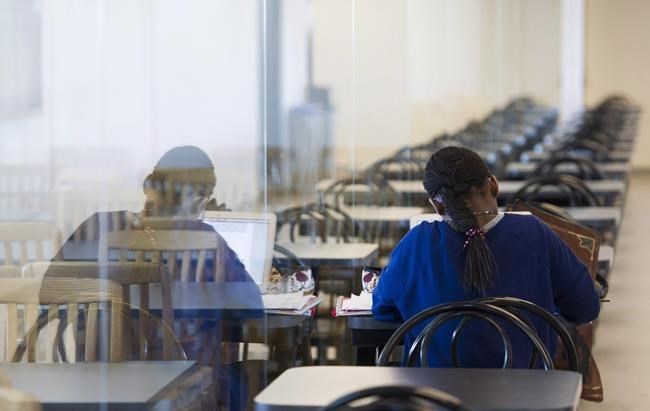MONTREAL — Some Quebec junior colleges say 80 to 90 per cent of the international students they've accepted from Africa are being refused study permits by the federal government, jeopardizing their ability to offer programs and raising questions about bias in the immigration system.
At the CEGEP de la Gaspésie et des Îles, in eastern Quebec, only two of 19 students from Africa who were accepted to the school and requested permits were able to secure one, according to its general manager. At Collège d'Alma, in the Saguenay-Lac-St-Jean region, 20 students out of 139 got permits.
Representatives of both colleges say that, in comparison, virtually every student who applies from France is accepted.
Yolaine Arseneau, the manager of the Gaspé junior college, says the number amounts to an 89 per cent refusal rate for African students. "We find that enormous," she said.
In a phone interview, she said the situation is frustrating for the college, which goes to great lengths to recruit international students, only to have efforts fall flat. Not to mention the impact on the students themselves.
"It must be very discouraging for them," she said.
Frédéric Tremblay, the communications head at Alma College, says there appears to be a "distortion" between the federal government and the province — particularly in regions outside greater Montreal, which are faced with an aging population and a labour shortage.
He said the main reason given for refusing study permits is that authorities don't believe the applicant will return home after studying — even as the province hopes to retain them. "It's advantageous for Quebec to go find students who already speak French and who we can train here to keep them in the workforce," he said.
Sometimes, he said, students are refused on the basis of not having the financial means to support themselves — even if they've been awarded full scholarships.
The refusal of permits for students coming from Africa is nothing new, and it is an issue at all educational levels and in all provinces, said Francis Brown Mastropaolo, the director of international affairs for Quebec's federation of CEGEPs. But he said Quebec junior colleges and their prospective students are hit the hardest.
Rejection rates vary by country, he said, and some of the highest are in French-speaking African countries where Quebec seeks immigrants, such as Algeria and Congo. At the same time, rejection rates tend to go down with higher levels of study, meaning refusals at the college level are higher than those for master's and PhD candidates, he said.
Overall, he estimates that 80 per cent of junior college study permits from French-speaking Africa are rejected by the federal government, compared with 30 to 35 per cent for students from India and 20 per cent from China.
He said the colleges that are affected the most are those in Quebec's outlying regions, which have low enrolment and need the boost from international students to be able to maintain programs.
"Sometimes having three, four, five international students allows us to start the program for a three-year cycle, and consequently there is more access for local students," he said.
Arseneau believes more French-speaking international students provides both a potential future workforce and help to ensure the survival of programs to benefit locals. In addition, students from varied backgrounds improve the student experience through "intercultural exchange," she added.
While the college representatives can't say for sure whether racial bias is a factor in the differing acceptance rates, they say it's at least a possibility — something even the federal government acknowledges.
Brown Mastropaolo was one of many experts who testified when the House of Commons committee on citizenship and immigration began studying the issue in February.
The committee produced a report with 35 recommendations, including more transparency on reasons for refusal, regulating recruitment agencies to safeguard against fraud and working with schools and provinces to reduce misunderstandings that can lead to refusals.
It also called on the federal government to clarify the rules to ensure that a student's request isn't jeopardized because they eventually want to settle in Canada.
In a response tabled Sept. 28, the federal government acknowledged the issues that were raised.
"While all applications are assessed against the same criteria, regardless of an applicant’s country of origin, the department recognizes that the impacts of historical racism and discrimination extend to Canada’s immigration system," wrote Immigration, Refugees and Citizenship Canada.
"While approval rates for study permit applications for those intending to study in Quebec are similar to those destined to other provinces, more work is required within the department to understand the differences in study permit approval rates between Africa and other regions."
In its 20-page response, the government committed to working with the Quebec government on study permits. It also agreed to work on providing better information on its application process, increasing training and resources for its personnel and reviewing the way it assesses candidates, including ensuring that those who may eventually want to immigrate to Canada aren't punished.
Brown Mastropaolo said that after years of work, it's "encouraging" to see the federal government finally acknowledging the long-standing problems in the system. "Now, what we want to see are results," he said.
This report by The Canadian Press was first published Nov. 4, 2022.
Morgan Lowrie, The Canadian Press



